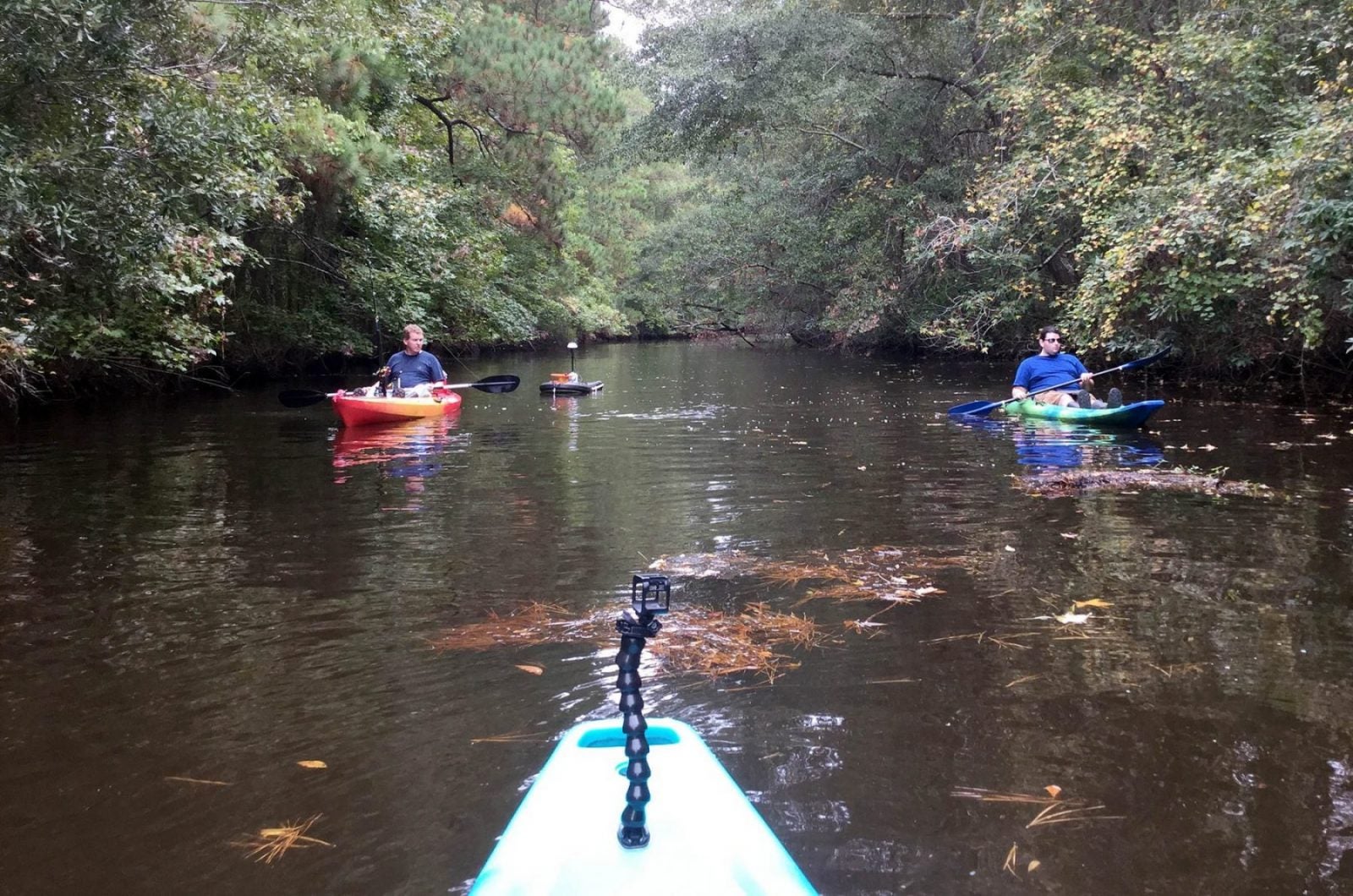ECU team gets grant to help communities adjust to sea level rise

Dr. Randall Etheridge, left, assistant professor in the Department of Engineering at East Carolina University, and a research student paddle kayaks as they measure water flow and survey the bottom of a canal near Lake Mattamuskeet. Etheridge and a team of researchers from ECU have received a nearly $300,000 grant to explore the impact of sea level rise on communities near the lake. (Photo courtesy of Randall Etheridge)
A nearly $300,000 grant will allow a team of researchers from East Carolina University to look at sea level rise and its impact on communities.
The $299,454, two-year grant comes from the National Science Foundation. It includes an interdisciplinary approach involving ECU’s Department of Engineering and Department of Anthropology as well as the Coastal Studies Institute, a multi-institutional research and education partnership of the University of North Carolina System led by ECU.
“It’s about helping coastal communities adjust to sea level rise, specifically smaller coastal communities that don’t have the resources like a New York or a Miami or other big metropolitan areas,” said Dr. Randall Etheridge, assistant professor of engineering and principal investigator on the grant.
The research has two goals — to explore and design possible solutions to flooding in the Lake Mattamuskeet area of Hyde County and to develop a process with community input that could then be used to help other similar communities. Three groups of ECU engineering students working on their senior capstone projects will be part of the research team.
“We’re looking at a process,” Etheridge said. “It includes going out and working with the community to understand what their concerns are and the things that they want to see from an engineering design solution. From this process, we want to apply this to other areas. We want to see if this method or framework will work in other areas, and we’re using Lake Mattamuskeet as a test case.”
The water level at Lake Mattamuskeet has been increasing, which can impact nearby farmland, particularly during major rain events. According to a Hyde County report on Hurricane Matthew in 2016, about 75% of the county’s cotton crop, 50% of its soybean crop and 95% of its snap bean crop were lost in the storm, greatly impacting the people and the economy.
“Because Hyde County is at low elevation, as conditions change along the coast, it becomes harder for water that collects in the lake from the surrounding watershed to passively drain out through the lake’s drainage canals to Pamlico Sound,” said Dr. Linda D’Anna, a research associate with the Coastal Studies Institute and a memberof the research team. “Without this exit, the water has to find someplace else to go. And where it has been going is back onto the land, flooding people’s properties and causing a variety of concerns.”
Dr. Cynthia Grace-McCaskey, assistant professor of anthropology and a Coastal Studies Institute research associate, said her role with the research team is to give community members a voice in the process.
“A lot of the residents are people who have lived there and worked there for generations, and their priorities are not just to pack it in and leave, so it’s a matter of learning how to adapt and helping to solve those problems in a collaborative way,” she said. “It’s also important, as someone who has done work with resiliency and done some work with flooding recovery, to understand the reasons why people are not willing to leave their communities — what is the importance of a sense of place — so we need to find ways to adapt if the people are going to stay there. As an outsider, it could be easy to say that it’s flooding and they need to move, but these are real people, and it’s not that easy. It’s a very complex situation, and I think it’s important to understand all perspectives when trying to solve these problems.”
Dr. Raymond Smith, an associate professor of engineering, is also a member of the research team, which will involve as many as 14 students.
Lake Mattamuskeet is the largest natural lake in North Carolina, covering about 40,100 acres or roughly 126 square miles. Located in northeastern North Carolina about 90 miles east of Greenville, the Hyde County lake is known as a home away from home for about 200,000 migratory birds each winter.
###
ECU News Services
Howard House, 1001 E. Fifth Street
Greenville, NC 27858
ecunews@ecu.edu
Phone: 252-328-6481
news.ecu.edu
Contact: Ken Buday, ECU News Services, budayk19@ecu.edu
Telephone: 252-737-5461